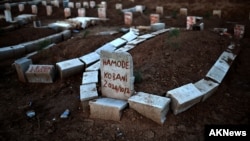The peace process between the Kurdistan Workers Party (PKK) and Turkey is continuing despite warnings by rebels that negotiations are facing collapse over two primary concerns: Ankara's inaction in stopping the advance of Islamic State militants in Kobani, and the Turkish military's recent airstrikes on PKK bases.
Although the government has begun unveiling a road map for peace, and Kurdish politicians have confirmed that talks are continuing, negotiations are under increasing threat.
Parliamentary deputy and honorary chair of the Pro Kurdish Peace and Democracy Party (HDP), Ertugrul Kurkcu, says the situation is serious but not hopeless.
"Every day the government has been sending very heavy words against the PKK," said Kurkcu. "[And with] Turkish warplanes attacking PKK [military bases], these all show the climate is not getting better for a solution."
"On the other hand," he added, "talks between our delegation and the government are going on and the mechanisms are working. The delegations are coming and going, and the government is delivering their road maps, etcetera."
The ruling AK Party initiated the peace process nearly two years ago in hopes of ending three decades of conflict with the PKK, which is fighting for greater minority rights.
A Turkish government spokesman said progress was being made and that the government will unveil a plan. A so-called road map for peace has been a key demand by imprisoned PKK leader Abdullah Ocalan.
Kadri Gursel, an expert on the Kurdish conflict and diplomatic columnist for the Turkish newspaper Milliyet, says the rebel leader is in an increasingly difficult position because his reputation is on the line with his supporters.
"Ocalan is in a very difficult situation because since he made this call for a cease-fire and withdrawal from armed units of the PKK in March 2013, nothing has been taken by the government to advance the so called peace and solution process," he said.
Soli Ozel, an international relations expert at Istanbul’s Kadir Has University, says the importance of Ocalan to the peace process was underlined earlier this month when Prime Minister Ahmet Davutoglu turned to the rebel leader to end a wave of nationwide anti-government protests by Kurds.
He warns that while Ocalan’s intervention was effective in ending the unrest, faith in the peace process could be waning among Kurds.
"Personally, I happened to think that the trust that is necessary to carry on with this is gone," said Ozel. "I hope it's not dead, but it's certainly under a lot of duress."
Political columnist Semih Idiz of the newspaper Taraf says Davutoglu may fear rising Kurdish expectations could threaten to alienate his core Turkish nationalist voters and that he may be already preparing to look beyond the peace process.
"The peace process is hinging in what happens in Kobani at the moment and what happens in Northern Syria in general," he said. "But I think he [Davutoglu] is weighing Turkish nationalist sentiment against Kurdish national sentiment and deciding that Turkish nationalist sentiment as far as he and his party and his ideology concerned is ultimately more important."
Courting Turkey's nationalist votes could be key to the prime minister's chances of securing victory in elections due in June 2015. Observers warn if the peace process fails to make significant progress, many Kurds may not support the ruling AK party as they have done in previous elections.
HDP's Kurkcu says they are determined to get the process back on track, although he admits it's entering a critical phase.
"We are expecting to gain the process some momentum after their visit to Kandil," he said.
Kandil is the mountain hideout where the PKK military leadership is based. They are among the most skeptical over the government's sincerity towards the peace process and warn of more protests if the Syrian border city Kobani falls to Islamic militants. But with U.S. air strikes assisting Syrian Kurdish fighters, observers say the peace process has been given a reprieve, for now.




